The success of a unforgettable virtual career fair strongly depends on a fantastic feature set to ensure not just fast recruitment, but a stimulating experience, secure interactions, and of course measurable performance outcomes. Acknowledging the unique objectives of each hosting organization, various virtual hosting platforms offer a range of functionalities to help make hiring a breeze, build employer visibility, and target best user experiences. Like the sound of these perks? Let’s dive into the core functionalities offered by virtual platforms that strengthen employer branding, reduce time-to-hire, meanwhile ensuring that your visitors are blown away with a lasting first impression.
1) Branded Custom Landing Page:
The first step to getting your virtual career fair noticed is setting up an exciting custom branded page where job seekers can register for the event, build profiles, and upload their resumes. Providing a career fair overview, schedule, exhibitor details, job search advice and additional information to match host’s preferences, facilitating event registration in a matter of minutes is a powerful reflection of the organization’s culture and competency.
Multi Platform Compatibility:
Accommodating job seeker attendance from around the world involves selecting a vendor that provides event hosting compatible with Android and iOS platforms. Your virtual career fair should be accessible from mobile and desktop devices to fully benefit from the benefits of global outreach, travel free participation, and the flexibility to log in to the event from any time zone in the world.
3) Customizable Branded Booths:
The highlight of a highly anticipated virtual career fair are its exhibitors and the vacancies they have to offer. Mimicking the feel of a real life event, your virtual platform of choice should provide each exhibitor with custom designed booths and staff avatars to represent company representatives. Additionally, booths should enable ease of information exchange with tabs leading to content such as downloadable brochures, company job board, videos, and of course chat option to communicate with recruiters.
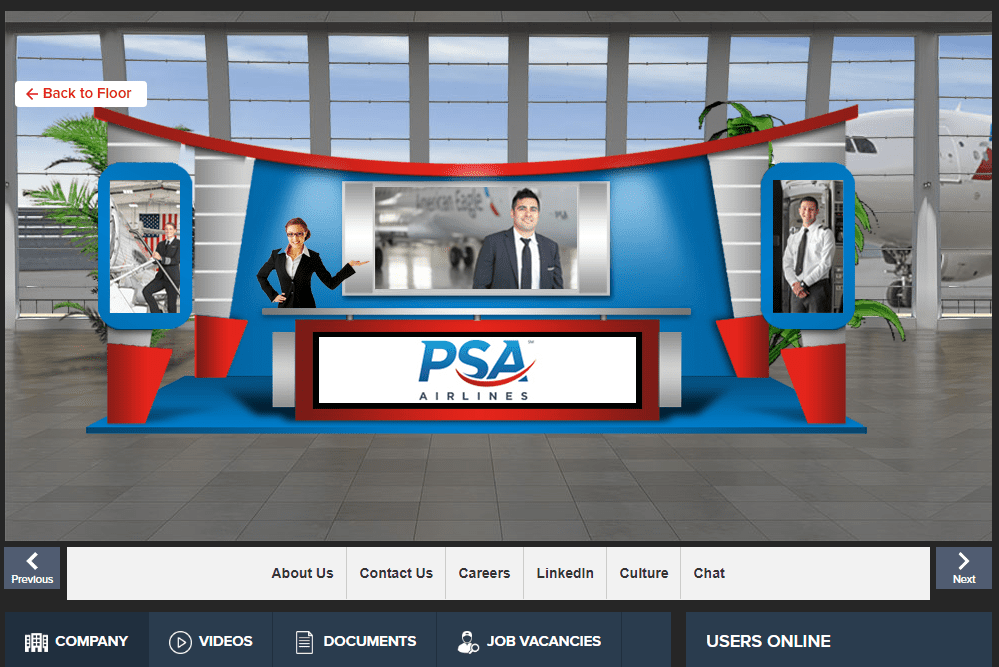 4) Easy Navigation:
4) Easy Navigation:
Speaking of replicating the feel of a physical event in an online setting, the virtual platform should be able to offer a fantastic user experience enabling visitors to browse in a user-friendly manner. Clearly titled spaces such as lobby, exhibitor hall, auditorium, information desk and networking lounges all serve dedicated functions and allow job seekers to navigate seamlessly without wondering what to expect or where to click. P.S. Want more brand promotion? All these spaces can be branded with display ads promoting sponsors and organizers logos to ensure utmost visibility in the prime spots with highest visitor volume.
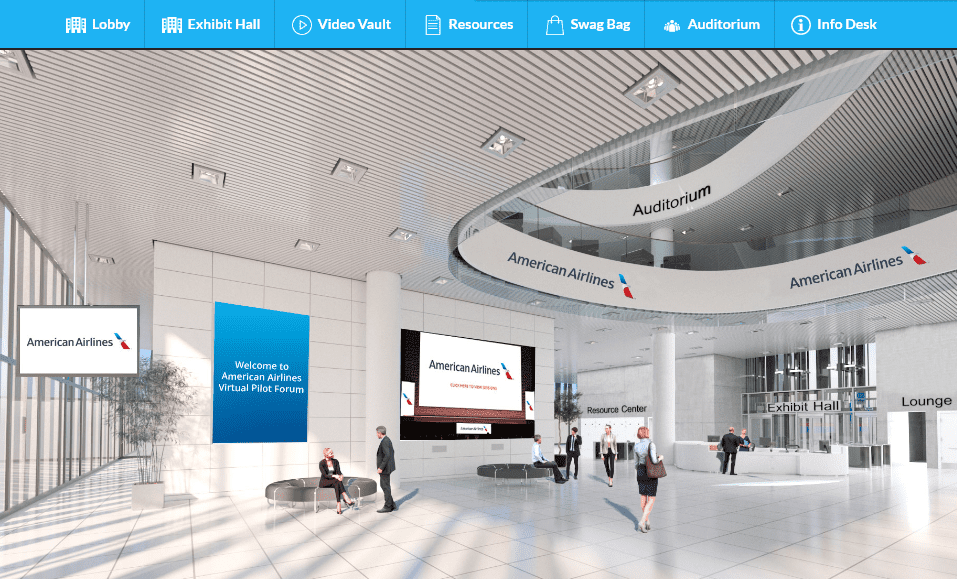 5) Secure Chat Options:
5) Secure Chat Options:
Virtual career fairs thrive on open yet secure communication between attendees and exhibitors. By incorporating audio, video and text based chat capabilities, talent can easily reach out to employer representatives. Moreover, recruiters can answer questions and even conduct on the spot screenings to fill positions at an unprecedented speed.
6) Networking Lounge:
In addition to offering solutions accommodating direct chat with employer representatives, another notable feature to mention is the Networking Lounge. Allowing all job seekers to connect in a chat room encouraging open dialogue and discussion, conversations can be initiated and valuable connections made.
7) Immersive Webinars:
Attracting and retaining job seeker attendance has traditionally been a challenge for career fair hosts. Dynamic webinars are the virtual event superstars with on-demand and live content offering keynotes speeches from organizers, Q&A sessions with industry experts, and other guest speakers sharing helpful advice to spearhead an overall immersive attendee experience.
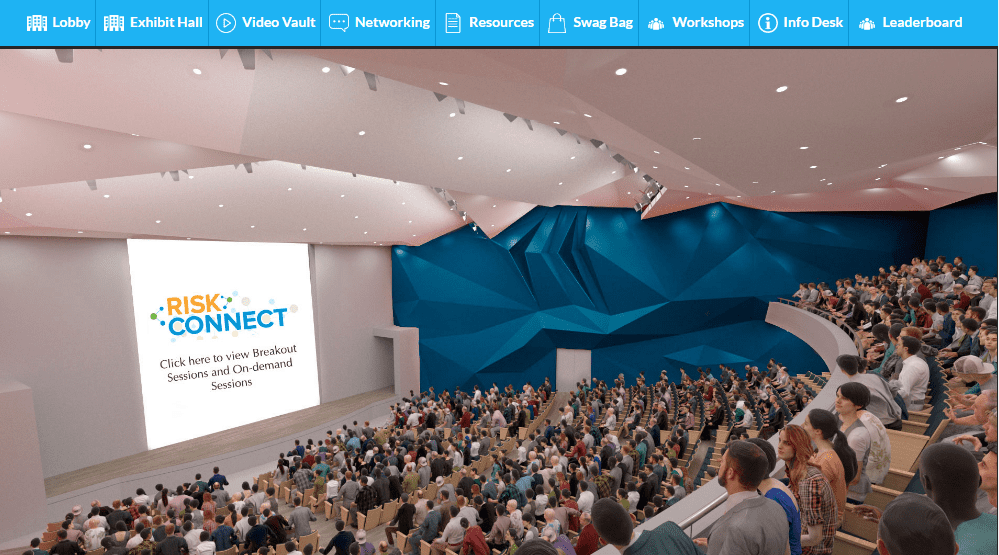 8) Swag Bags:
8) Swag Bags:
One of the many benefits of a virtual career fair is the reduced carbon footprint; paper less marketing and electronic job applications are ideal for eco friendly employers interested in pursuing a “greener” hiring strategy. The online event should enable all downloadable resources to be added to what some vendors call a “Swag Bag” or a “Briefcase”. Once job seekers are done browsing booths and downloading required information, the technology allows talent to mail these items to their desired email ID for ease of future retrieval and referencing.
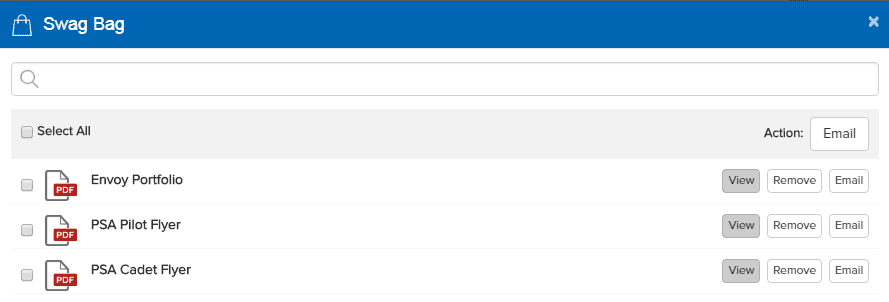 9) Video Repository:
9) Video Repository:
Providing streamable videos highlighting company culture, upcoming initiatives, and other incentives to spark job seeker interest in applying for positions, employers can make use of this feature to share compelling content bound to be well received targeted prospects. 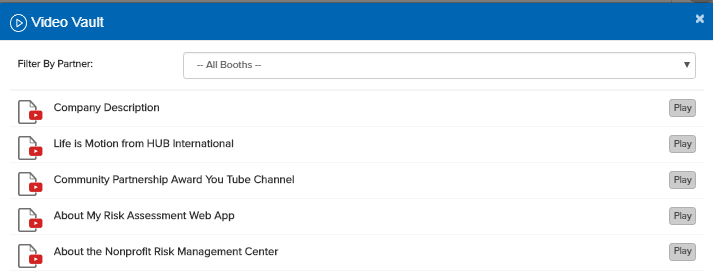
10) Information Desk:
For a job seeker or exhibitor new to the world of virtual events, the virtual career fair should incorporate a Help or Information Desk staffed by your technology provider to ensure that all guests’ questions are promptly answers, and any unanticipated technology hiccups immediately reported, for seamless event navigation and engagement.
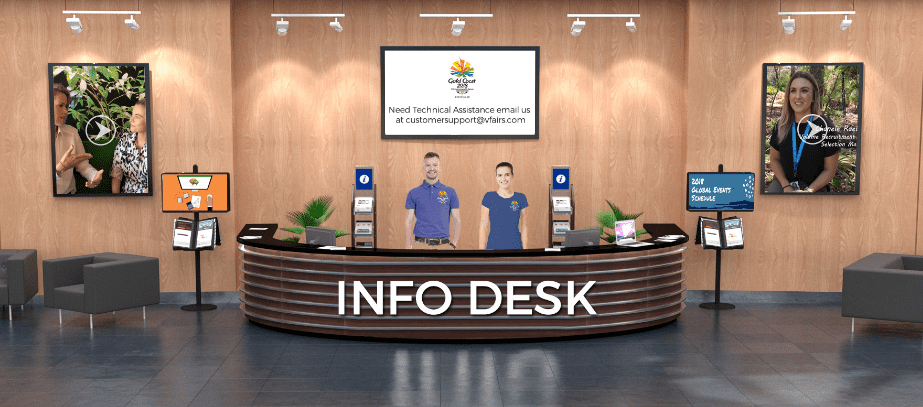 11) WCAG Accessibility Compliance:
11) WCAG Accessibility Compliance:
Mindful design and smart technology makes it easy to achieve inclusivity amongst guests with varying abilities and special needs. The virtual career fair should ideally be setup in compliance with Web Content Accessibility Guidelines (WCAG ) offering special color contrasts, text character flexibility, page narrations, captioned webinars, etc to make the event exceptionally intuitive and meaningful.
12) Resume Search Filters:
The goal of a virtual career fair is connecting employers and job seekers in a convenient online setting to enhance the applicant pool available for recruiters to choose from. Smart resume search features allow quick short listing based on their selected criteria to zoom into the talent of highest relevance within seconds for further screening. 
13) Real Time Job Board:
Making it effortless to search for jobs based on industry, job type, or company name, the job board makes it easy for talent to submit resumes. Meanwhile, the organizers enjoy the benefit of having real time insights pertaining to metrics such as most viewed jobs and applicant counts to keep track of most popular employers and vacancies.
14) Measurable Results:
Measuring the success of an event should leave no room for guess work. By hosting a virtual career fair, tracking and measuring all performance metrics that matter from registrations, attendees, booth visits, webinar views, job applications received, chats initiated, etc are an essential feature for hosts to look forward to.
15) Gamification:
What’s a virtual event without a little twist to it? Features such as leaderboards and scavenger hunts can be incorporated into your event to award points to guests based on activity and give away sponsored prizes. Gamification works well as proven strategy to keep your visitors excited and active throughout the duration of the event. 
Want to learn more about Virtual Career Fairs? Read “The Ultimate Guide to Virtual Career Fairs”.


